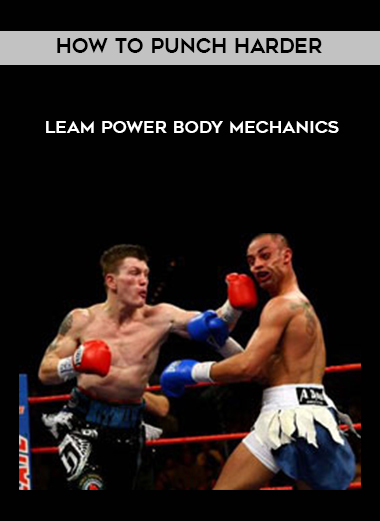How to Punch Harder – Leam Power Body Mechanics
HOW TO PUNCH HARDER – LEAM POWER BODY MECHANICS
This is the ultimate punching guide for boxers, fighters, and just about anyone who wants to learn how to punch correctly and punch hard! Learn how to throw knockout punches now!
Before we even talk about power punching, you have to learn some basic theories about how power is generated from the body. Next you’ll learn about how to position your body so that all your power and body weight is being channeled efficiently into your punches. After this, you’ll learn the proper punching technique in full detail to learn how to throw a harder punch. Lastly, I’ll leave you with some final tips on how to maximize the damage dealt on the other boxer.
Basic theories you must understand to punch hard:
- Speed is not Power – Power is acceleration times mass. Power is not only speed, you must have a force (or a weight) behind that speed. A fast punch will not hit hard unless you put some body weight behind it.
- Move Your Body – Like Bruce Lee’s theory behind his famous one-inch punch: moving your whole body one inch hits much harder than moving your arm one foot. You must move your entire body to get the maximum force (weight) behind that punch. The trick is not to focus on moving your body a great distance but rather to move it all at the same time.
- Use Your Legs – The biggest muscles in your body will generate the most power. People who punch only with their arms will never punch with real power.
- Stay Inside Your Range – Your strongest punch doesn’t land when your arms are fully out-stretched. Your punch hits harder when it lands a bit shorter than your full range of motion. Don’t reach!
- Use Angles – Punching from different angles will give your punches more power, more punching opportunities, and more damage on your opponent.
Flow Of Energy
- FEET
- They are spread on the ground a little wider than shoulder width.
- The back foot always starts with the heel lifted.
- When punching, the feet will pivot in the direction of the punch.
- As you throw multiple punches, your feet will pivot back and forth pushing in different directions as you throw different punches.
- When you throw a right handed punch, the right heel is lifted while the left foot is flat; the opposite is true when you throw a punch from the left hand.
- Your feet never leave the ground when you throw a power punch. (This rule can be broken LATER once you learn how to throwing pivoting punches.)
- LEGS
- Knees are always slightly bent.
- As you punch, you drop your bodyweight into your legs bending the knees slightly.
- HIPS
- Turn your hips. Spin them into your opponent as if you were punching your opponents with your hips.
- UPPER BODY
- Your torso should rotate as much as possible and spin the punch out from your shoulders.
- A full rotation with short arm extension hits harder than a small rotation with full arm extension.
- Don’t lean forward. Don’t try to reach forward, rotate instead!
- SHOULDERS
- Your shoulders are stay loose during the punch to keep the punches relaxed and save energy while increase speed and power.
- Try to raise your shoulders during your punch. This makes the punch stronger since it’s now involving the shoulder muscles.
- ARMS
- Your arms start relaxed.
- As the punch is thrown, your arms spring out towards your opponent extending just enough to hit your opponent.
- Don’t let your punches over-extend or else you’ll get countered.
- Do not pull your fist back right before a punch. This is called, “telegraphing” and allows experienced fighters see the punch coming, minimizing its impact.
- HANDS
- Your hands are relaxed when you are not punching. You can make a loose fist but don’t clench it.
- When you punch, that fist transforms into a brick as your deliver it to your opponent.
- Your glove starts at your face and ends at your face.
- Your turn your fist over (horizontal) for straight punches, but your fist can stay vertical when you swing a left hook to the body or throwing pivot left hooks.
- HEAD
- Exhale sharply on every punch.
- Your eyes are 100% alert. Always look at the target you’re punching.
- Your chin is tucked down a little so that it’s covered a bit by the shoulder on your punching arm.
Everything I just described is called the flow of energy. You want to feel the energy traveling through your entire body from the feet to the fist. If one part of the body is lazy or feels uninvolved, you need to train harder to make that part of your body an active participant in the punch.
Aiming
- Learn the distance of all your punches. Do it again with a quick front foot step. Try to keep your punches WITHIN this range.
- Punching too close or too far of a distance diminishes your power.
- Jab
- Stepping forward quickly will make this punch much stronger.
- Extend your fist all the way and lift that front shoulder a little to really stab your opponent with this jab punch.
- Don’t lean forward when you throw this punch, save that momentum for your right cross.
- Straight Right or Right Cross
- Body rotation, body rotation, body rotation.
- The ABSOLUTE best aim for this punch is not in front of you. I’ll tell you where it is; do this: extend your jab out as if you were to jab someone. Really straighten out that left arm all the way and hold it. Now imagine your opponent slipping to the left OUTSIDE of your jab and his face is about one foot to the left of your extend jab fist. That new space in the air that you are looking at now is your strongest punching point. Don’t believe me? Try it on the punching bag. Stand to the right side instead of directly in front of the bag and over-rotate yourself counter-clockwise to hit the bag. Feel that power? GOOD!
- Left Hook
- Elbows stay low when you throw hooks to the body and elbows go high when you throw hooks to the head.
- Learn to throw a stopping hook. Don’t let the hook pass through your opponent. Practice stopping your hook when it’s in front of you. This gives it the “smack” sound and also keeps you from over-rotating on that hook.
- Don’t forget to spin both feet so that they’re pointing to the side when you throw that left hook.
- As you throw the left hook, drop the right heel and lift the left heel to put leg strength into the left hook.
- Right Hook
- When you throw a right hook, swing your body weight from your back foot to your front foot and make sure you push your head into the punch and look at where it’s hitting.
- Also, don’t throw your head to the side when you throw the right hook, instead bring it forward but try to keep it in front of your target. (This hits harder but in some cases, you’ll have to move that head more to stay out of harm’s way.)
- Uppercut
- Forget what you saw in Street Fighter 2.
- A real uppercut is short and quick. The punch doesn’t go straight up, it actually goes forward.
- Imagine yourself throwing a big right cross. Now start a new one, but instead – flip your fist so that the palm is facing up. Now throw that right hand straight at your opponent’s head.
- An uppercut isn’t necessarily thrown from the floor down up, it’s thrown more like from your waist so it’s diagonal. The point is: it’s still got plenty of horizontal momentum, it’s not completely vertical.
Hitting Your Opponent
This is a very important to learning how to punch hard. You can’t just throw a hard punch anytime you want. You have to learn when to throw it. You have to be at a proper distance. Not just for the first punch but for the second one as well.
The best time to hit your opponent:
- When he’s punching – getting hit by a counter-punch hurts more than anything else.
- When he’s not expecting it – you can achieve this by breaking through his defense or simply throwing punches in a weird rhythm. Very fast boxers can do this by simply throwing a super fast lead right hand or left hook.
- From an angle – Hitting your opponent from an angle can hurt him more, stun him better, and at the very least disrupt him for another hard punch.
Common Mistakes
- Lifting Your Feet – if you lift your feet, you’ve taken your full body weight out of your punch’s power.
- Reaching – Over-extending never does the trick. More often than not, you’ll just lose your balance and get countered. Over-committing will limit you to one punch whereas keeping your balance will allow you to throw several.
- Forgetting The Jab – If you don’t throw your jab, you’ll never set up those big punches. Use the jab! It’s short, powerful, and can setup the hard punches by stunning or distracting your opponent momentarily.
- Punching Too Fast – What happens is you get too excited and start throwing “arm punches” where it’s just arm power flying out really fast. Of course you’ve got tons of energy and it still feels like a hard punch but as time goes by, your arms tire and now you’ve got no power.
- Telegraphing – Don’t cock your fist back right before you throw it. Too many boxers try to build this rhythm in the ring that they’re punching becomes predictable. Learn to stand in front of a bag completely still and throw a punch when someone says go. Don’t bounce around too much building a predictable rhythm for your opponent.
- Stay Away From Weights – Trying to bench press to build your power punch is like lifting leg weights to break the sprint record. Although there are many conflicting articles out there that argue back and forth between whether or not lifting weights will aid your punch, the science is quite simple: when you lift weights, your body is becoming stronger at moving slow (punching is a fast movement). Not only that, but training with weights will only make you noticeably stronger within a limited range of motion. Your body will also be building unnatural muscle that will tire much faster than your regular muscle. If building truly powerful and effective muscle was possible, a great middleweight boxer could easily be a great heavyweight boxer, right?
Power Punching Exercises and Drills
- Punch Slow – One of the best drills I give to everyone is I make them punch slow. I make them punch as hard as they can but slow. I make them go about half speed. What amazes everyone is that just about everybody I have taught realizes that they punch harder when they punch slow than when they throw punches fast. The reason for this is because nobody’s body moves as fast as their arms do. The arm usually finishes the punch before the body has even begun to rotate. By punching slow, they are allowing their entire body to get into the punch and to really help build the power. The drill is to stand square (feet side-by-side spread farther than shoulder width) in front of a punching bag or somebody with focus mitts and to throw alternating left crosses and right crosses. In between each punch, the boxer will POSE for 2 seconds as if taking a picture before beginning the next punch. Just try it! There are many exercises a boxer can do to speed up the body, but for now the goal is to PUNCH SLOW!
- Swimming – swimming is an AWESOME way to build power in your whole body. There aren’t too many other exercises that can build endurance and power in your entire body like swimming.
- Isometric training – Lean at a wall and make a fist at it. Now push your fist into the wall like you’re throwing a punch that’s stuck. Give full effort for 10 seconds and then repeat on the other side. 15 reps and 3 sets per arm should be perfect. This is training your body how to store energy. You’re training your body, in a sense, to become a powerful rubberband and once the barrier is released – BAM!
In order to learn how to punch harder, you must be willing to forget everything you know and try new things. As with everything, boxing is an art and there is always room for improvement. Boxers that think they know everything will never be able to learn how to punch harder. Keeping an open mind and paying attention to techniques and strategies that are not your own is the best way to learn. Respect punching techniques different from your own and see how you can incorporate their techniques into your own.
Delivery Method
– After your purchase, you’ll see a View your orders link which goes to the Downloads page. Here, you can download all the files associated with your order.
– Downloads are available once your payment is confirmed, we’ll also send you a download notification email separate from any transaction notification emails you receive from coursesblock.com.
– Since it is a digital copy, our suggestion is to download and save it to your hard drive. In case the link is broken for any reason, please contact us and we will resend the new download link.
– If you cannot find the download link, please don’t worry about that. We will update and notify you as soon as possible at 8:00 AM – 8:00 PM (UTC 8).
Thank You For Shopping With Us!








